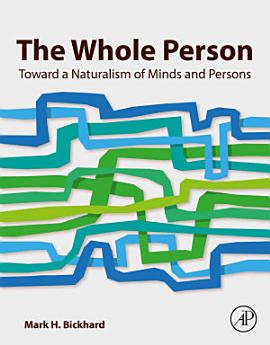The Whole Person: Toward a Naturalism of Minds and Persons
Nov 2024 · Elsevier
Ebook
300
Pages
family_home
Eligible
info
reportRatings and reviews aren’t verified Learn More
About this ebook
The Whole Person explores the realms of theory and philosophy concerning minds and persons. This book presents models of the emergent realization of multiple mental processes, and of the constitution of social realities and social persons. Each chapter explores prevalent theoretical and philosophical assumptions that obstruct the acceptance of models depicting emergent realization, offering analyses of these barriers, and demonstrating ways to overcome them. Rooted in the framework of process metaphysics, this book models metaphysically genuine emergence, paving the way for a comprehensive model of multifarious normative emergences. These normative emergences include phenomena such as function-dysfunction, representational truth and falsity, rational-irrational, ethical-unethical, and others that shape our mental and social landscapes. The discussion extends to the macro-evolutionary culmination of mental processes in a model of reflective consciousness. The book then extends its exploration to the foundational role of mental processes in the emergence of social realities and persons, with language acting as a core element in these emergences. Addressing evolutionary aspects, brain processes, developmental processes, moral normativities, and self-consistency considerations, The Whole Person presents a holistic integration of decades of constructive work.Endorsements:"This ambitious, yet unpretentious, carefully constructed and argued book is a must read for anyone with serious interest in the nature of persons and the psychology of personhood. Mark Bickhard's The Whole Person is a sustained and convincing narrative about our individual and collective evolution and emergence as the unique beings that we are. Of particular interest is his account of the emergence of persons as homo-socius. Here, Professor Bickhard captures key, but often overlooked, historical, sociocultural, and socio-developmental dynamics and processes that make us who we are—a species constantly interacting with each other and the world in a never-ending process of mutual co-constitution. By theorizing a process metaphysics replete with emergent normativity that does not clash with a naturalistic ontological psychology, Bickhard takes a giant step toward seeing ourselves as we are and as we might become." -- Jack Martin, Professor Emeritus, Simon Fraser University"A typical psychological theory offers narrow generalizations about data sets obtained by semi-proprietary empirical methods. The basic empirical research on which such theories have depended is in crisis: tremendous effort has gone into ill-motivated studies, applying statistics inappropriately to inadequate samples, too often generating irreproducible results. The kind of theory that psychology needs is broad and deep, pays no respect to boundaries between specialties, makes falsifiable predictions, and answers to arguments in principle. The Whole Person presents just such a theory; psychologists, whether their aim is to extend it and support it or to challenge it and refute it, will benefit from studying it closely." -- Robert L. Campbell, Professor (Emeritus), Psychology, Clemson University
About the author
Mark Bickhard is the Henry R. Luce Professor in Cognitive Robotics and the Philosophy of Knowledge at Lehigh University, and is affiliated with the Departments of Philosophy and Psychology. His work ranges from process metaphysics and emergence to consciousness, cognition, language, and functional models of brain processes, to persons and social ontologies. Bickhard's work on cognition features a model of cognition as emergent in agent processes for interacting with the world.
Rate this ebook
Tell us what you think.
Reading information
Smartphones and tablets
Install the Google Play Books app for Android and iPad/iPhone. It syncs automatically with your account and allows you to read online or offline wherever you are.
Laptops and computers
You can listen to audiobooks purchased on Google Play using your computer's web browser.
eReaders and other devices
To read on e-ink devices like Kobo eReaders, you'll need to download a file and transfer it to your device. Follow the detailed Help Center instructions to transfer the files to supported eReaders.






